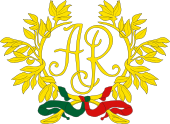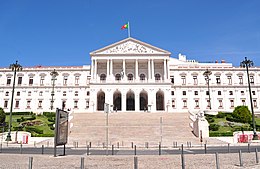Portuguese parliament
|
Assembly of the Republic Assembleia da República |
|
|---|---|

Coat of arms of the Assembly of the Republic
|
|

Flag of the Assembly of the Republic
|
|
| Type | |
| Type | |
| Leadership | |
|
Vice Presidents
|
|
| Structure | |
| Seats | 230 |
 |
|
|
Political groups
|
Government (86)
Supported by (36) Opposition (109) |
| Elections | |
|
Party-list proportional representation D'Hondt method Closed list |
|
|
Last election
|
4 October 2015 |
|
Next election
|
October 2019 or earlier |
| Meeting place | |
 |
|
 |
|
| São Bento Palace, Lisbon, Portugal | |
| Website | |
| Assembleia da República | |
Government (86)
Supported by (36)
Opposition (109)
The Assembly of the Republic (Portuguese: Assembleia da República, pronounced: [ɐsẽˈblɐjɐ dɐ ʁɛˈpublikɐ]) is the Portuguese parliament.
According to the Portuguese Constitution, the unicameral Assembly "is the representative assembly of all Portuguese citizens." The constitution names the assembly as one of the country's organs of supreme authority.
It is located in a historical building in Lisbon, referred to as Palácio de São Bento (Palace of Saint Benedict), the site of an old Benedictine monastery. The Palácio de São Bento has been the seat of the Portuguese parliaments since 1834 (Cortes until 1910, Congress from 1911 to 1926 and National Assembly from 1933 to 1974).
The Assembly of the Republic's powers derives from its power to dismiss a government through a vote of no confidence, to change the country's laws, and to amend the constitution (this one requires a majority of two-thirds). In addition to these key powers, the constitution grants to the Assembly extensive legislative powers and substantial control over the budget, the right to authorize the government to raise taxes and grant loans, the power to ratify treaties and other kinds of international agreements, and the duty to approve or reject decisions by the President of the Republic to declare war and make peace. The assembly also appoints many members of important state institutions, such as ten of the thirteen members of the Constitutional Court and seven of the sixteen members of the Council of State.
...
Wikipedia
